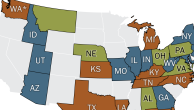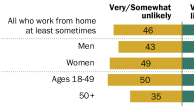Yet even as the internet has taken on a central role in how people find and apply for work, a minority of Americans would find it difficult to engage in many digital job seeking behaviors – such as creating a professional resume, searching job listings online, or following up via email with potential employers. And while many of today’s job seekers are enlisting their smartphones to browse jobs or communicate with potential employers, others are using their mobile devices for far more complex and challenging tasks, from writing a resume to filling out an online job application.
Among the key findings:
The internet is a top resource for many of today’s job hunters: Among Americans who have looked for work in the last two years, 79% utilized online resources in their most recent job search and 34% say these online resources were the most important tool available to them
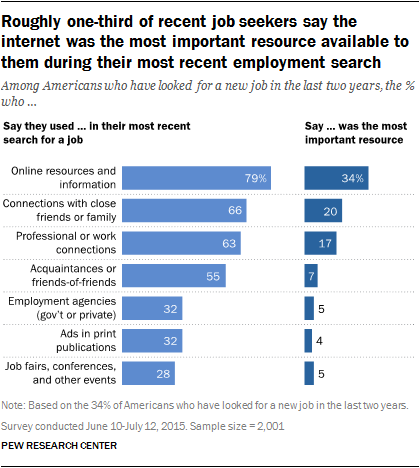
Like many other aspects of life, job seeking is going mobile: 28% of Americans have used a smartphone as part of a job search, and half of these “smartphone job seekers” have used their smartphone to fill out a job application
- 94% of smartphone job seekers (representing 26% of all American adults) have used their smartphone to browse or research job listings.
- 87% (representing 24% of all adults) have called a potential employer on the phone using their smartphone.
- 74% (representing 20% of all adults) have used their smartphone to email someone about a job they were applying for.
At the same time, many are using their phones for much more complex tasks:
- 50% of smartphone job seekers (representing 14% of all adults) have used their smartphone to fill out an online job application.
- 23% (representing 6% of all adults) have used their smartphone to create a resume or cover letter.
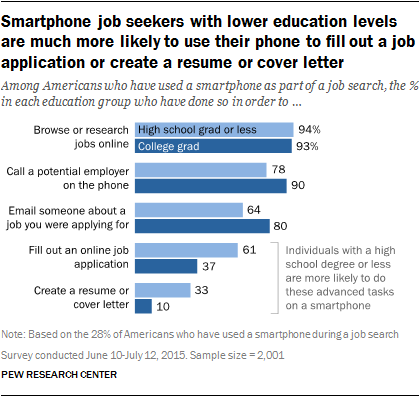
Americans with relatively low levels of educational attainment tend to lean heavily on their smartphones for online access in general, and this also play out in the ways members of this group utilize their smartphones while looking for employment. Among Americans who have used a smartphone in some part of a job search, those with higher education levels are more likely to use their phone for basic logistical activities – such as calling a potential employer on the phone or emailing someone about a job. On the other hand, smartphone job seekers who have not attended college are substantially more likely to have used their phone for more advanced tasks, such as filling out an online job application or creating a resume or cover letter.1
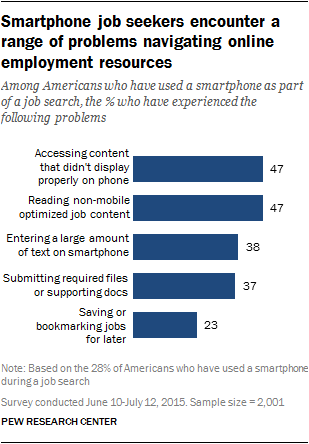
Overall, 47% of smartphone job seekers say their phone is “very important” in helping them look for job and career resources, and an additional 37% describe it as “somewhat important.” But despite the overall significance of smartphones to these users, many of them have encountered challenges navigating the job search process on a mobile device. Nearly half of smartphone job seekers have had problems accessing job-related content because it wasn’t displaying properly on their phone or had difficulty reading the text in a job posting because it was not designed for a mobile device. And more than one-in-three have had trouble entering a large amount of text needed for a job application or had difficulty submitting the files or other supporting documents needed to apply for a job.
Even as digital job seeking skills have become increasingly important, a minority of Americans would find it challenging to engage in tasks such as creating a professional resume, using email to contact potential employers, or filling out a job application online
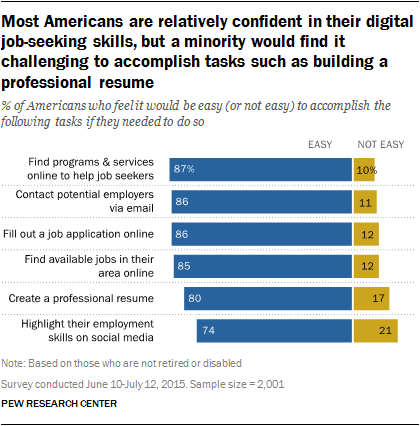
Despite the importance of digital resources when it comes to looking for work today, a minority of Americans would find it difficult to engage in a variety of digital job-seeking behaviors.
Building a professional resume is among the most prominent of these challenges: Some 17% of Americans (not including those who are retired and/or disabled) indicate that it would not be easy to create a professional resume if they needed to do so. Another 21% say that it would not be easy to highlight their employment skills using a personal website or social media profile. Roughly one-in-ten indicate that it would be difficult for them to go online to find lists of available jobs (12%); fill out a job application online (12%); use email to contact or follow up with a potential employer (11%); or look up online services available to assist job seekers (10%).
In many cases, Americans who might benefit the most from being able to perform these behaviors effectively – such as those with relatively low levels of educational attainment – are the ones who find them most challenging. For instance, 30% of those with a high school diploma or less would have trouble creating a professional resume (compared with just 6% of college graduates), as would 28% of those who are currently not employed (double the 14% of employed Americans who would find it difficult to do this).
Many Americans now use social media to look for and research jobs, share employment opportunities with friends, and highlight their skills to potential employers; 13% of social media users say their social media presence has helped them find a job
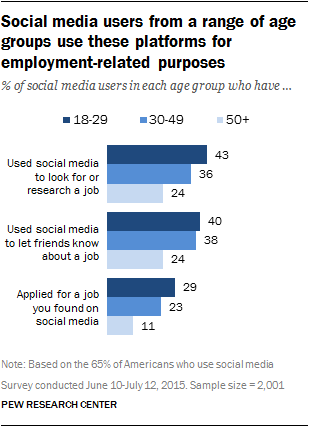
Younger users are especially active at utilizing these platforms for employment-related purposes, but many older users are taking advantage of social media when looking for work as well. Roughly one-quarter of social media users ages 50 and older have used these platforms to look for work or to let their friends know about job openings, and 11% of older social media users have applied for a job they first found out about on social media.
